人教新目标八年级上册Unit 2 How often do you exercise Section A (1a-2d)课件(共22张PPT,无音频)
文档属性
| 名称 | 人教新目标八年级上册Unit 2 How often do you exercise Section A (1a-2d)课件(共22张PPT,无音频) | 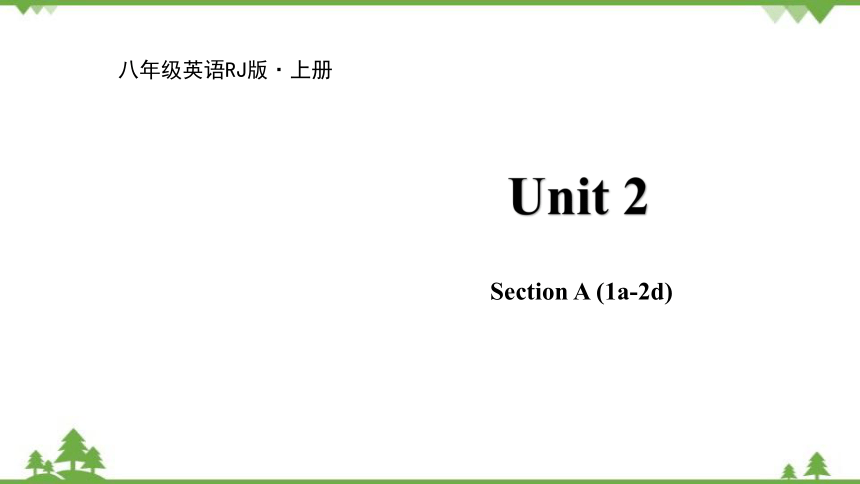 | |
| 格式 | pptx | ||
| 文件大小 | 3.9MB | ||
| 资源类型 | 教案 | ||
| 版本资源 | 人教新目标(Go for it)版 | ||
| 科目 | 英语 | ||
| 更新时间 | 2023-06-01 16:36:09 | ||
图片预览


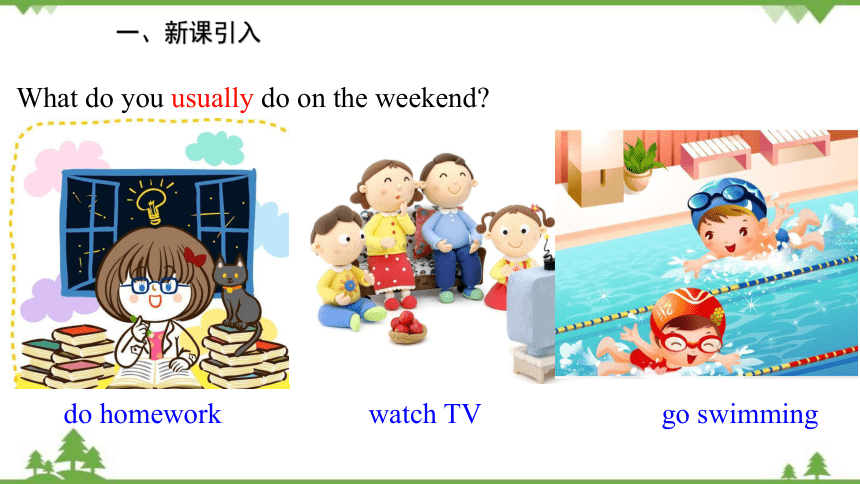
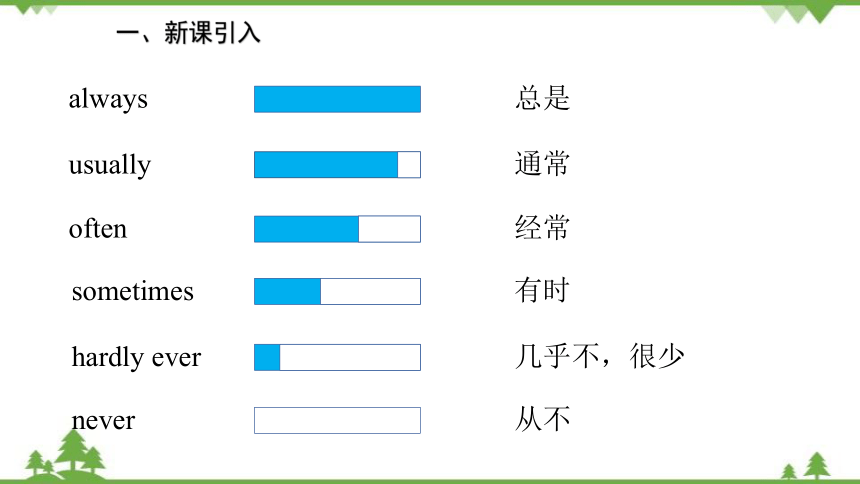
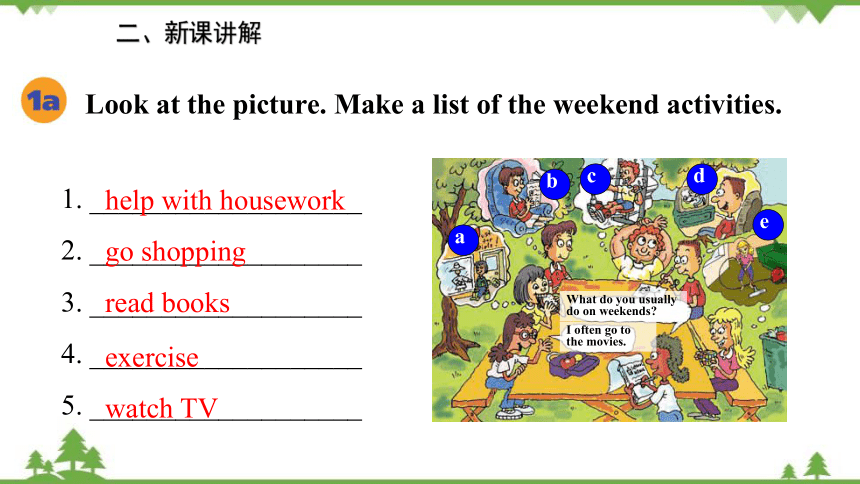
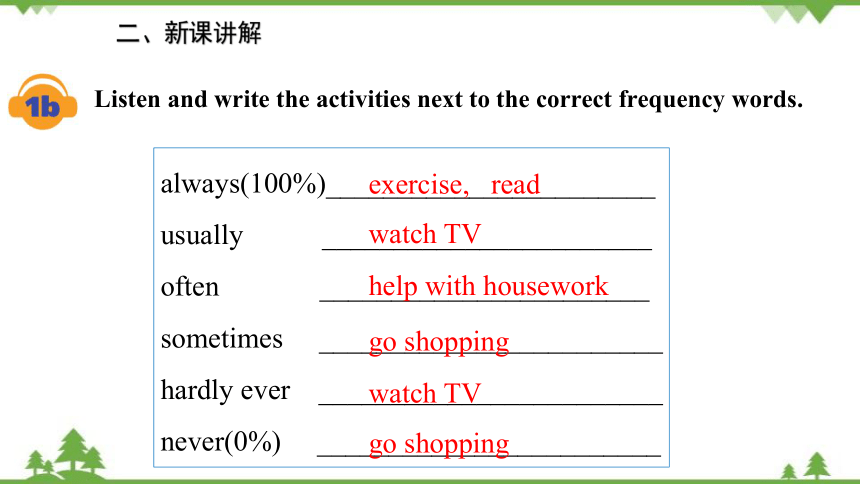
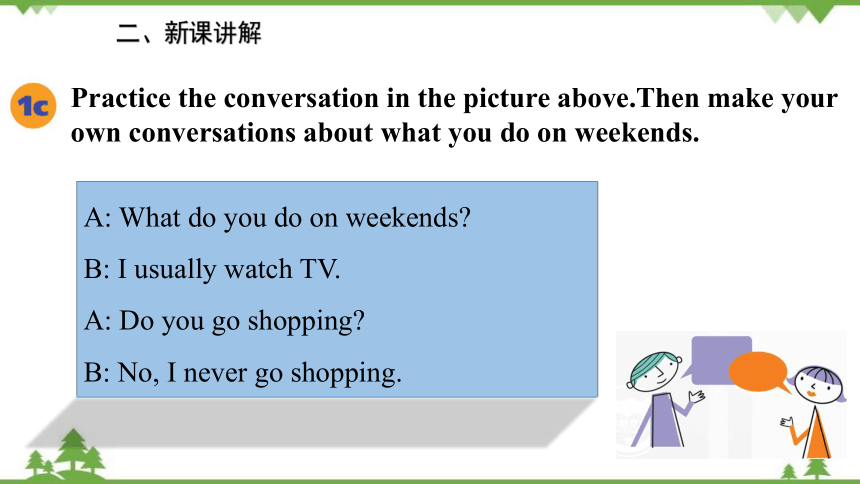
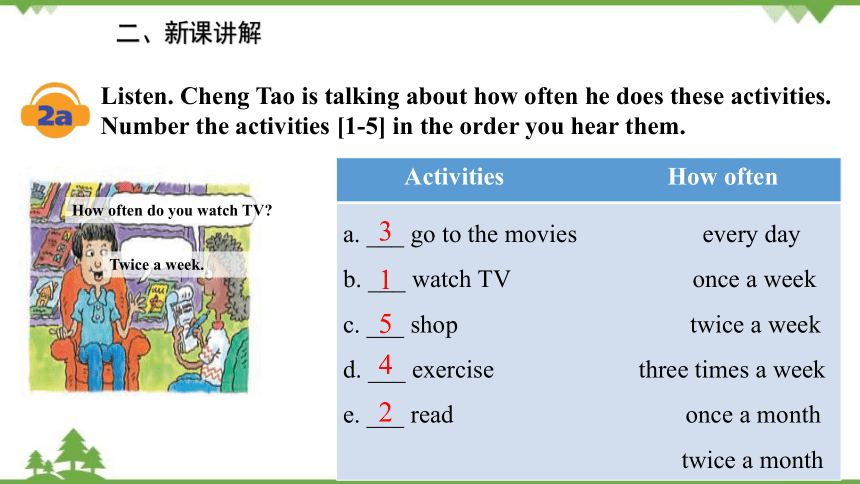
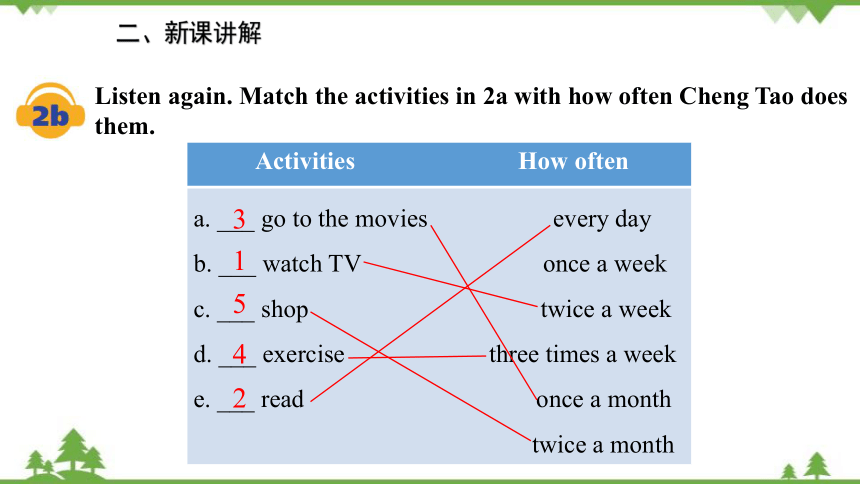
文档简介
(共22张PPT)
Unit 2
八年级英语RJ版·上册
Section A (1a-2d)
一、新课引入
Brain storming
What can we do on the weekend
I usually…
read
exercise
go shopping
help with housework
一、新课引入
What do you usually do on the weekend
do homework
watch TV
go swimming
一、新课引入
always
usually
often
sometimes
hardly ever
never
总是
通常
经常
有时
几乎不,很少
从不
二、新课讲解
Look at the picture. Make a list of the weekend activities.
1. ___________________
2. ___________________
3. ___________________
4. ___________________
5. ___________________
help with housework
go shopping
read books
exercise
watch TV
What do you usually
do on weekends
I often go to
the movies.
a
b
c
d
e
二、新课讲解
Listen and write the activities next to the correct frequency words.
always(100%)_______________________
usually _______________________
often _______________________
sometimes ________________________
hardly ever ________________________
never(0%) ________________________
exercise, read
watch TV
help with housework
go shopping
watch TV
go shopping
A: What do you do on weekends
B: I usually watch TV.
A: Do you go shopping
B: No, I never go shopping.
Practice the conversation in the picture above.Then make your
own conversations about what you do on weekends.
二、新课讲解
Listen. Cheng Tao is talking about how often he does these activities.
Number the activities [1-5] in the order you hear them.
二、新课讲解
Activities How often
a. ___ go to the movies every day
b. ___ watch TV once a week
c. ___ shop twice a week
d. ___ exercise three times a week
e. ___ read once a month
twice a month
How often do you watch TV
Twice a week.
1
2
3
4
5
二、新课讲解
Listen again. Match the activities in 2a with how often Cheng Tao does
them.
Activities How often
a. ___ go to the movies every day
b. ___ watch TV once a week
c. ___ shop twice a week
d. ___ exercise three times a week
e. ___ read once a month
twice a month
3
1
5
4
2
二、新课讲解
How often do you do these activities
Fill in the chart and then make conversations.
A: How often do you watch TV
B: I watch TV every day.
A: What’s your favorite program
B: Animal World.
A: How often do you watch it
B: Twice a week.
Activities How often
watch TV every day
use the Internet
read English books
go to the movies
exercise
Jack: Hi, Claire, are you free next week
Claire: Hmm … next week is quite full for me, Jack.
Jack: Really How come
Claire: I have dance and piano lessons.
Jack: What kind of dance are you learning
Claire: Oh, swing dance. It’s fun! I have class once a week, every Monday.
Jack: Ho often do you have piano lessons
Claire: Twice a week, on Wednesday and Friday.
Jack: Well, how about Tuesday
Claire: Oh, I have to play tennis with my friends. But do you want to come
Jack: Sure!
二、新课讲解
Role-play the conversation.
1. on weekends 意为“在周末,每逢周末”。
辨析:on the weekend 在这个周末,特指在某个周末。
on weekdays 在工作日
I usually go to the English club on weekends.
我通常在周末去英语俱乐部。
Could you please help me clean the house on the weekend
这个周末你能帮我打扫房子吗?
Language points
二、新课讲解
二、新课讲解
2. help with housework 意为“帮忙做家务”。
help常用搭配:
help (sb.) with sth./help sb. (to) do sth.
意为“帮助(某人)做某事”。
Tom usually help me with my English. 汤姆经常帮我学英语。
We should help mom (to) do housework. 我们应该帮妈妈做家务。
Language points
二、新课讲解
Language points
3. sometimes 副词,意为“有时”。相当于at times。如:
I sometimes play football on weekends. 我有时周末踢足球。
= I play football at times on weekends.
辨析:sometimes 表示动作发生的不经常性,常用语一般现在时。
sometime “在某时”,表示某个不确定或不具体的时间,
常用于过去时或将来时。
some times 名词短语,“几倍,几次”。
some time 名词短语,“一段时间”。
二、新课讲解
Language points
4. free 形容词,意为“空闲的”。
Mr. Green will be free at 12:00. 格林先生将在12点有空。
另外:free 用作形容词,还表示“自由的,免费的”。
The cola is free. You don’t have to pay for it.
这杯可乐是免费的,你不需要付钱。
5. full 形容词,意为 “忙的,有很多活动的”。
Her life is so full that she can’t find any time for her hobbies.
她的生活非常忙碌以至于她找不到时间从事业余爱好。
另外:full 意为 “满的”或者“吃饱的”。
常见搭配:be full of 充满……
The bottle is full of water. 这个瓶子装满了水。
二、新课讲解
Language points
二、新课讲解
Language points
6. How come 常用习语,意为“怎么会呢?”
相当于why,可单独使用,也可加句子,用来询问事情的原因或状况。
How come you get up so early = Why do you get up so early
你为什么起这么早?
三、归纳小结
1. Adverbs of Frequency:
always, usually, often, sometimes, hardly ever, never
once a week, twice a week, three time a week, every day
2. Target language:
(1)—How often do you watch TV
—Every day.
(2)—What do you usually do on weekends
—I usually do my homework.
四、强化训练
用所给单词的适当形式填空。
1. I go to the library _______ (one) a week.
2. I read books three _______(time) a week.
3. How often _______ (do) your brother _______ (watch) TV
4. Tom hardly ever ________ (play) soccer on weekends.
once
times
does
watch
plays
四、强化训练
根据汉语意思完成句子。
1. 你多久去看一次祖父母?______ ______ do you visit your grandparents
大约一月两次。About _______ a month.
2. 你通常周末做些什么?_______ do you usually do on weekends
我通常帮妈妈做家务。I ______ ______ my mother _______ housework.
3. 我爸爸一周三次打篮球。
My dad ______ ____________ three times a week.
How often
twice
What
usually help do
plays basketball
四、强化训练
4. 我有时做作业会到很晚。
I __________ do my homework very late at night.
5. 你可以自由做决定。
You are _______ to make your decision.
6. 我吃饱了。
I am ________ now.
sometimes
free
full
五、布置作业
1. Role-play the conversation in 2d.
2. Read and memorize the new words.
Unit 2
八年级英语RJ版·上册
Section A (1a-2d)
一、新课引入
Brain storming
What can we do on the weekend
I usually…
read
exercise
go shopping
help with housework
一、新课引入
What do you usually do on the weekend
do homework
watch TV
go swimming
一、新课引入
always
usually
often
sometimes
hardly ever
never
总是
通常
经常
有时
几乎不,很少
从不
二、新课讲解
Look at the picture. Make a list of the weekend activities.
1. ___________________
2. ___________________
3. ___________________
4. ___________________
5. ___________________
help with housework
go shopping
read books
exercise
watch TV
What do you usually
do on weekends
I often go to
the movies.
a
b
c
d
e
二、新课讲解
Listen and write the activities next to the correct frequency words.
always(100%)_______________________
usually _______________________
often _______________________
sometimes ________________________
hardly ever ________________________
never(0%) ________________________
exercise, read
watch TV
help with housework
go shopping
watch TV
go shopping
A: What do you do on weekends
B: I usually watch TV.
A: Do you go shopping
B: No, I never go shopping.
Practice the conversation in the picture above.Then make your
own conversations about what you do on weekends.
二、新课讲解
Listen. Cheng Tao is talking about how often he does these activities.
Number the activities [1-5] in the order you hear them.
二、新课讲解
Activities How often
a. ___ go to the movies every day
b. ___ watch TV once a week
c. ___ shop twice a week
d. ___ exercise three times a week
e. ___ read once a month
twice a month
How often do you watch TV
Twice a week.
1
2
3
4
5
二、新课讲解
Listen again. Match the activities in 2a with how often Cheng Tao does
them.
Activities How often
a. ___ go to the movies every day
b. ___ watch TV once a week
c. ___ shop twice a week
d. ___ exercise three times a week
e. ___ read once a month
twice a month
3
1
5
4
2
二、新课讲解
How often do you do these activities
Fill in the chart and then make conversations.
A: How often do you watch TV
B: I watch TV every day.
A: What’s your favorite program
B: Animal World.
A: How often do you watch it
B: Twice a week.
Activities How often
watch TV every day
use the Internet
read English books
go to the movies
exercise
Jack: Hi, Claire, are you free next week
Claire: Hmm … next week is quite full for me, Jack.
Jack: Really How come
Claire: I have dance and piano lessons.
Jack: What kind of dance are you learning
Claire: Oh, swing dance. It’s fun! I have class once a week, every Monday.
Jack: Ho often do you have piano lessons
Claire: Twice a week, on Wednesday and Friday.
Jack: Well, how about Tuesday
Claire: Oh, I have to play tennis with my friends. But do you want to come
Jack: Sure!
二、新课讲解
Role-play the conversation.
1. on weekends 意为“在周末,每逢周末”。
辨析:on the weekend 在这个周末,特指在某个周末。
on weekdays 在工作日
I usually go to the English club on weekends.
我通常在周末去英语俱乐部。
Could you please help me clean the house on the weekend
这个周末你能帮我打扫房子吗?
Language points
二、新课讲解
二、新课讲解
2. help with housework 意为“帮忙做家务”。
help常用搭配:
help (sb.) with sth./help sb. (to) do sth.
意为“帮助(某人)做某事”。
Tom usually help me with my English. 汤姆经常帮我学英语。
We should help mom (to) do housework. 我们应该帮妈妈做家务。
Language points
二、新课讲解
Language points
3. sometimes 副词,意为“有时”。相当于at times。如:
I sometimes play football on weekends. 我有时周末踢足球。
= I play football at times on weekends.
辨析:sometimes 表示动作发生的不经常性,常用语一般现在时。
sometime “在某时”,表示某个不确定或不具体的时间,
常用于过去时或将来时。
some times 名词短语,“几倍,几次”。
some time 名词短语,“一段时间”。
二、新课讲解
Language points
4. free 形容词,意为“空闲的”。
Mr. Green will be free at 12:00. 格林先生将在12点有空。
另外:free 用作形容词,还表示“自由的,免费的”。
The cola is free. You don’t have to pay for it.
这杯可乐是免费的,你不需要付钱。
5. full 形容词,意为 “忙的,有很多活动的”。
Her life is so full that she can’t find any time for her hobbies.
她的生活非常忙碌以至于她找不到时间从事业余爱好。
另外:full 意为 “满的”或者“吃饱的”。
常见搭配:be full of 充满……
The bottle is full of water. 这个瓶子装满了水。
二、新课讲解
Language points
二、新课讲解
Language points
6. How come 常用习语,意为“怎么会呢?”
相当于why,可单独使用,也可加句子,用来询问事情的原因或状况。
How come you get up so early = Why do you get up so early
你为什么起这么早?
三、归纳小结
1. Adverbs of Frequency:
always, usually, often, sometimes, hardly ever, never
once a week, twice a week, three time a week, every day
2. Target language:
(1)—How often do you watch TV
—Every day.
(2)—What do you usually do on weekends
—I usually do my homework.
四、强化训练
用所给单词的适当形式填空。
1. I go to the library _______ (one) a week.
2. I read books three _______(time) a week.
3. How often _______ (do) your brother _______ (watch) TV
4. Tom hardly ever ________ (play) soccer on weekends.
once
times
does
watch
plays
四、强化训练
根据汉语意思完成句子。
1. 你多久去看一次祖父母?______ ______ do you visit your grandparents
大约一月两次。About _______ a month.
2. 你通常周末做些什么?_______ do you usually do on weekends
我通常帮妈妈做家务。I ______ ______ my mother _______ housework.
3. 我爸爸一周三次打篮球。
My dad ______ ____________ three times a week.
How often
twice
What
usually help do
plays basketball
四、强化训练
4. 我有时做作业会到很晚。
I __________ do my homework very late at night.
5. 你可以自由做决定。
You are _______ to make your decision.
6. 我吃饱了。
I am ________ now.
sometimes
free
full
五、布置作业
1. Role-play the conversation in 2d.
2. Read and memorize the new words.
同课章节目录
- Unit 1 Where did you go on vacation?
- Section A
- Section B
- Unit 2 How often do you exercise?
- Section A
- Section B
- Unit 3 I'm more outgoing than my sister.
- Section A
- Section B
- Unit 4 What's the best movie theater?
- Section A
- Section B
- Unit 5 Do you want to watch a game show?
- Section A
- Section B
- Unit 6 I'm going to study computer science.
- Section A
- Section B
- Unit 7 Will people have robots?
- Section A
- Section B
- Unit 8 How do you make a banana milk shake?
- Section A
- Section B
- Unit 9 Can you come to my party?
- Section A
- Section B
- Unit 10 If you go to the party, you'll have a grea
- Section A
- Section B
